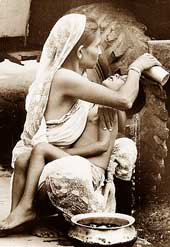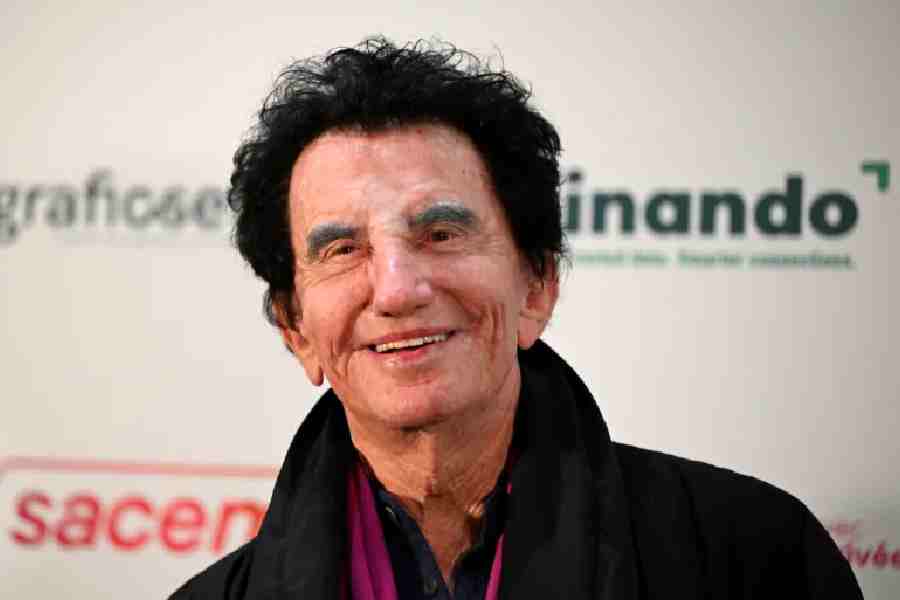 |
 |
| In the absence of proper medicines and healthcare facilities, deaths due to diseases like malaria and kala-azar have increased among the Pahariyas |
The Pahariya tribe of Santhal Parganas is on the verge of extinction. Though the government claims to have taken all possible steps to protect the endangered tribe, but nothing seems to have come of its efforts.
The writings on the walls in every districts of Santhal Parganas would make any visitor believe that the government was trying to protect the endangered primitive Pahariya tribesmen, who reside atop mountains surrounded with dense forests.
The banners put up by the district administration show how the government has launched several welfare projects to rehabilitate the tribes. But ask the Pahariya tribesmen and they will tell you that the posters, banners and graffiti on the walls are nothing but an eye wash for outsiders.
“These are nothing but tall claims by the government. They have done nothing for us. If the government and NGOs take no step to save us we will suffer both emotional and physical breakdown,” said a Pahariya.
Diseases like malaria and kalaazar claims many lives every year, but the administration is yet to distribute medicines or set up health clinics in the Pahariya villages.
Every year during the summer months the deadly black fever claims hundreds of lives. Black fever created havoc on the poverty-ravaged Pahariya villages. The number of casualty was high because of the villagers lack of immunity due to malnutrition.
The death of over 12 Pahariyas in the past two months due to kalaazar at Phitkoriya village under Rajbandh panchayat, some 25 km from the headquarters of state’s second capital, exposed the poor health facilities.
“We have 59 patients from the village suffering from kalazar. But we do not have enough doctors to provide them with medical attention,” said a doctor of the government hospital, where the patients have been shifted for treatment.
Such has been impact of kalazar on the Pahariyas that there is a old proverb which goes like this “If you like to know about kalaazar then go to Boraio, a Pahariya block in Sahebganj district”.
Hundreds of people die of the disease in Godda, Pakur and Dumka districts. According to surveillance medical officer of World Health Organisation (WHO) Prabir Chatterjee, kalaazar was first reported in Sahebganj district in 1987. Of the 5,887 patients suffering from the disease most were Pahariyas.
Among the patients, more than 3,100 were from Borio block in the district. More than 150 kalaazar patients were admitted to Saint Lucki Hospital under Hiranpur block in Pakur district.
Chatterjee recalled how he treated the Pahariya patients at a dispensary located at Sourghati. “Earlier, we conducted only Aldehite test and only such complains were entertained who had the symptom of high fever and large stomach. But in 1994 the then Bihar government made bone marrow test essential and we could detect the disease easily,” he said.
Like Sahebganj, the disease swept the remote areas of Godda, Pakur, Dumka and Deoghar. Reports of deaths filtered in from Jamtara district and in all the cases the death toll was maximum among the Pahariya community.
Non-availability of medicine compounded the problem for both the doctors and the patients. According to government records, there has been a resurgence of malaria and kalaazar in the areas where DDT was not sprayed.
Records also revealed that that the disease directly affected more than 2,800 Pahariya people with 679 deaths over the past year in Santhal Parganas.
The state chapter of WHO, which coordinates different local voluntary organisations for pulse polio surveillance expressed concerned over the failure to counter the rapid spread of the disease.
The then Santhal Parganas health service regional deputy director (RDD), Captain Pradeep Kumar, said the central quota for free kalaazar drugs were supplied to Bihar hospitals, where 85 per cent kalaazar affected patients of the country were found. But after bifurcation the drugs were not available. “We have applied to the Centre for supply of the drugs,” said state health minister, Dinesh Sarangi.
Gautam Sarkar











